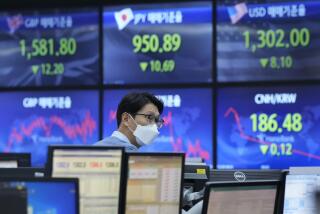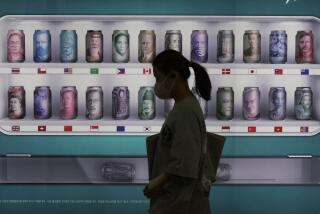Stronger Yen, Higher Rates Cast Doubt on Japan Recovery
- Share via
TOKYO — Prospects for a recovery in Japan’s nearly moribund economy are shrinking as the new year delivers the country with a worst-case scenario: rising interest rates and a strong yen.
It amounts to a double whammy that threatens Japanese exporters and consumers alike and renders meaningless much of the government’s efforts to stimulate the economy with massive spending, analysts say.
“This is a setback that will neutralize a lot of [government efforts] to spur economic growth,” said Matthew Poggi, economist with Lehman Bros. Japan. “It’s just one crisis [after] another here.”
Recession-bound Japan’s return to health is critical for the rest of hard-hit Asia, which needs Japanese investment and a robust market here for its goods. That, in turn, makes a Japanese recovery critical if the world is to dodge the threat of global recession threatened by the Asia crisis.
Japan, the world’s second-largest economy, is doubly important in the face of prospects that U.S. and European growth will slow this year, as many expect.
The yen briefly hit the 110.40 level against the dollar Tuesday, a 27-month high, before falling back to about 112 on Wednesday. In New York, it fell again as the dollar gained, along with U.S. stocks, to close at 112.66. But at midday today in Tokyo, the yen had rebounded to 112.45 to the dollar.
Just five months ago, the dollar was worth 147 yen. As the dollar sinks in value, it in effect raises prices of Japanese exports--or forces the exporters to swallow the currency losses.
At current levels, Japanese exporters find their cars, VCRs and TV sets priced about 25% higher in overseas markets than they were last summer, making them far less competitive. This creates problems because exporters have been one of the few solid performers in the Japanese economy. It could also mean higher prices for American consumers on everything Japanese, from Toyotas to DVD players.
In another development this week, the Industrial Bank of Japan raised its long-term prime lending rate from 2.2% to 2.9%, its first hike since July.
If the move sparks higher short-term rates, Japan could see more bankruptcies, higher unemployment, an even deeper banking crisis and a further slowdown in the housing market and other key parts of the economy, financial analysts said.
“The concern is that this would push dozens, even hundreds, of companies over the edge,” said Brian Waterhouse, analyst with HSBC Securities.
The bad news has sent Japan’s stock market tumbling. The benchmark Nikkei-225 index fell 4.4% early in the week on the heels of a 9% decline for all of 1998.
The Nikkei rallied a bit on Wednesday, gaining 1.8%. But a strong advance early today was fading in later trading, with the Nikkei at 13,644 at midday.
Shares of many major exporters, auto makers and interest-sensitive real estate and construction companies have been hit particularly hard recently.
Analysts are increasingly concerned that these trends, if sustained, could counteract the $360 billion in tax cuts, public works programs and other stimulus spending enacted over the last few months.
According to Susumu Takahashi of Nihon Research Institute, a sustained yen rate of about 115, a 1-point increase in Japan’s long-term interest rates and a 13,000 level for the Nikkei could throw 640,000 more Japanese out of work and cause the economy to shrink 1.5% or more next fiscal year on top of this fiscal year’s estimated 2.8% decline.
“We’re looking at the sand beneath our feet shifting and we’re already up to our shins,” said Darrel Whitten, strategist with ABN Amro.
Several factors appear to be pushing the yen higher. The U.S. trade deficit with Japan has risen sharply--Japan accounts for a major share of the $220-billion overall U.S. deficit expected for 1998--creating a huge imbalance and spurring a move out of dollars and into yen.
The impeachment process involving President Clinton has also hurt the dollar, as has competition from the new euro, the prospect of still-lower U.S. interest rates and Latin America’s anemic economic outlook, analysts say.
“It’s more a case of dollar weakness than yen strength,” Lehman’s Poggi said.
If currency markets move too far out of line, central banks are sometimes tempted to intervene--which in this case would mean buying dollars and selling yen to help Japan out.
Despite veiled threats by Japanese officials this week that this could happen, however, several analysts were skeptical. Japan would be wary of intervening without support from the U.S. Federal Reserve, they said, and the Fed is reluctant to lend its prestige unless the dollar starts to free-fall or Japan changes its fundamental policies.
There are already signs that the stronger yen is hurting Japan’s exporters. Their earnings have fallen while the country’s exports declined in November, the most recent month for which data are available.
Then again, what’s bad for Japan could be good for its neighbors by making their goods cheaper for Japanese buyers. “The strong yen pushes up imports, which helps [the rest of] Asia,” said HSBC economist Peter Morgan.
(Singapore’s stock market surged 5.7% on Wednesday, and Hong Kong’s market rose 3.5%.)
But the flip side is that the Japanese economy could see further deflation and more bankruptcies as foreign products pour in. And most economists believe a healthy Japan is a prerequisite to a sustained Asian recovery.
“A high yen applies a blowtorch to [Japanese] domestic pricing,” said Chris Calderwood, economist with Jardine Fleming Securities Asia Ltd. “The import competition is going to be savage at these levels.”
Driving Japan’s nascent rise in interest rates, analysts say, is Tokyo’s huge spending spree intended to jump-start the economy. The central government plans to borrow $303.6 billion and local governments an additional $98.2 billion this fiscal year alone to finance the mammoth public spending and tax cut programs.
This has forced the government to raise rates to attract enough buyers of the sudden flood of bonds, says Yoichi Tazawa, senior economist at Nomura Research Institute. Another, more psychological factor was a recent announcement by a Japanese government agency that it would no longer buy its own government’s bonds in the open market.
The fear surrounding the rise in the Industrial Bank of Japan’s prime rate, said HSBC’s Waterhouse, is that short-term bank rates will rise in tandem, which would hurt tens of thousands of borrowers and send still another shock wave through the economy.
*
Chiaki Kitada in the Tokyo bureau contributed to this report.
More to Read
Sign up for Essential California
The most important California stories and recommendations in your inbox every morning.
You may occasionally receive promotional content from the Los Angeles Times.













